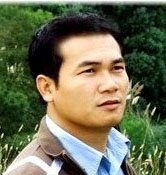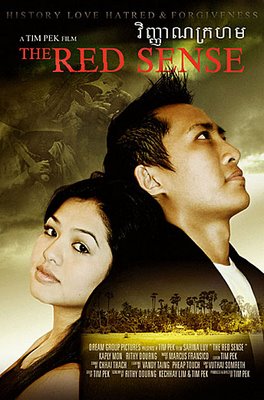A week tonight, on Friday 24 April at 7pm,
The Red Sense will get its first screening in Phnom Penh at Meta House, near Wat Botum. Everyone is welcome. You can see the poster for the film
here. The film is a Khmer story, played by Khmer actors with dialogue in the Khmer language, with English subtitles. It is set in Australia and Cambodia and deals with the legacy of the Khmer Rouge, so it's very timely, with the KR Tribunals currently taking place here in Phnom Penh. The film's Battambang-born director
Tim Pek can't make the screening in person, so I asked him a few questions by email in order to provide more of an insight into his debut feature film and filmmaking in general.
Q. As the director, what do you want the audience to feel and take away, from your debut film? A. As the director, I really want to give the audience something to think about when they leave their seats and share my knowledge. Many directors do a short horror as their debut film as I guess it's a good way to explore their passion and show the audience an array of creativity. That crossed my mind also, but I wanted to extend myself and use my abilities, so I decided to go with a drama-thriller genre film, with a sense that everyone can relate to this universal theme.
Q. How do you think a Khmer audience will view the film differently from a non-Khmer audience, and has that been evident so far? A. So far we have had a lot of positive testimonials and feedback from Australian audiences, but I think it's going to be very different from a Khmer audience in Cambodia. Our work will be different for them, we use real voices, no dubbing, we have written an original soundtrack and theme songs, and used dolby surround sound, etc. And the story is quite fresh and unique as well. I hope they will follow the same path in making their films in the future.
Q. How do you see your film contributing to the genre of Cambodian filmmakers, old and news? A. We know what sort of genre Khmer audiences expect to see, ie. ghost or period pieces, which is the reason we are taking a different approach, hoping they will be interested in our vision and begin to move away from the genre they are stuck in. We really want to bring our film industry back on track like they used to produce in the early 1960s and '70s.
Q. Is it important to make a feature film on the life and times, and impact on Cambodian history, by King Jayavarman VII? Is it important to concentrate on history, or to produce films that focus on today and provide a current dialogue? A. Due to the reconciliation issues we are facing currently and plus the Khmer Rouge Tribunal which is happening in Phnom Penh right now, I am hoping to pass a message through my film and help to heal some wounds suffered by the Khmer survivors as well as bring it to the fore of the younger generation. To follow in the footsteps of our greatest King, Jayavarman VII is the ideal task for a filmmaker, and which I would love to bring to the screen. Most importantly, it is about awakening the Khmer spirit to love each other and to protect our territory, as we are doing currently with the Preah Vihear situation.
Q. What is your next film project? A. I have two projects at the post production stage right now: Bokator, The Great Angkorian Martial Art and Annoyed, Dead Messenger. I must admit that both projects have been in post production for a while now, I haven't forgotten them though, and hope people will be a little more patient and hang in with me, as I need a bit more time for research and finding resources. They will be released this year.
Q. Finally, what are the frustrations, and joys of being a filmmaker? A. That's a good question. To balance it out, not much frustration for me, I view it more like joy, which helps keep my momentum going and inspire me to produce the best quality work I can. Perhaps the downside of filmmaking is choosing the right talents and mundane stuff like getting permissions for locations, and not to mention editing, etc. The joys are one word - Result - that's when we know our limits and can learn from it as a filmmaker, but also we can make people happy with our work, as well as make them think.
My thanks to Tim for his replies. His co-screenwriter, director of photography and co-star
Rithy Dourng will be at next Friday's screening and will introduce the film, as well as be available to answer any questions afterwards. Make sure you come and meet Rithy in person. Find out more about The Red Sense
here.
Labels: Rithy Dourng, The Red Sense, Tim Pek
 In the run up to the first screening of The Red Sense in Phnom Penh - it will be screened at Meta House, next to Wat Botum, on Friday 24 April at 7pm - here's a brief interview with the film's director Tim Pek (pictured), a Cambodian now relocated to Melbourne in Australia, where he combined shooting his debut film with a number of scenes shot in Cambodia. Three years in the making, he employed Khmer actors, speaking in Khmer, with English subtitles. Find out more about the film here.
In the run up to the first screening of The Red Sense in Phnom Penh - it will be screened at Meta House, next to Wat Botum, on Friday 24 April at 7pm - here's a brief interview with the film's director Tim Pek (pictured), a Cambodian now relocated to Melbourne in Australia, where he combined shooting his debut film with a number of scenes shot in Cambodia. Three years in the making, he employed Khmer actors, speaking in Khmer, with English subtitles. Find out more about the film here. I've some news hot off the press for you: the first-ever Phnom Penh screening of Tim Pek's feature-film directorial debut, The Red Sense, will take place on Friday 24th April at 7pm at Meta House, next to Wat Botum. After receiving a Cambofest award when it got its first Cambodian screening in Siem Reap in December, Pek's made-in-Australia film about revenge and forgiveness when a women discovers the identity of the Khmer Rouge cadre who killed her father, will be very timely considering the ongoing Khmer Rouge Tribunal that begins again today in Phnom Penh. There were fears that the film's topic was too sensitive for some to be screened here, but it will now be shown afterall. You can find out more about the film here and I'll be bringing you additional news from The Red Sense camp closer to the screening date.
I've some news hot off the press for you: the first-ever Phnom Penh screening of Tim Pek's feature-film directorial debut, The Red Sense, will take place on Friday 24th April at 7pm at Meta House, next to Wat Botum. After receiving a Cambofest award when it got its first Cambodian screening in Siem Reap in December, Pek's made-in-Australia film about revenge and forgiveness when a women discovers the identity of the Khmer Rouge cadre who killed her father, will be very timely considering the ongoing Khmer Rouge Tribunal that begins again today in Phnom Penh. There were fears that the film's topic was too sensitive for some to be screened here, but it will now be shown afterall. You can find out more about the film here and I'll be bringing you additional news from The Red Sense camp closer to the screening date.